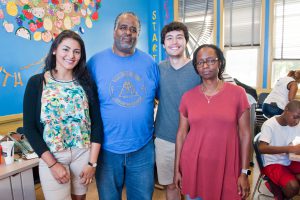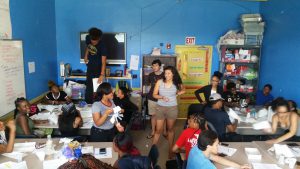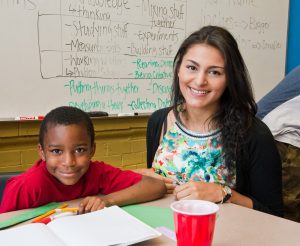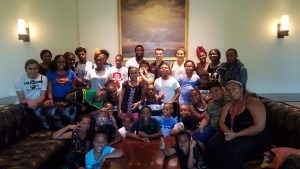This Summer, I worked with Nic Gedigk ‘19 and Associate Professor of Anthropology Candice Lowe Swift on a project using R.E.A.L. Skills as a case study on the impact and sustainability of community based non-profit organizations. Ultimately, we sought to expand our understanding of the role that these may play in creating personal and social change in low-income communities, and how such organizations might be sustained.
So, what is R.E.A.L. Skills? To me, it first began as an acronym. Then, it was an acronym that had meaning – Relationship. Empowerment. Affirmation. Leadership (R.E.A.L.). By the end, it was an acronym whose meaning exemplified a lived philosophy – the lived philosophy of a youth empowerment organization that draws its strength from its community (Poughkeepsie, NY), and channels that strength into a force for growth and change.
As a collaborative, feminist, and publicly engaged anthropological project, our main research methodologies were participant observation and ethnography. Accordingly, Nic and I went into R.E.A.L Skills daily, and deeply immersed ourselves within the workings of the operation. Essentially, we each played two roles – full time staff members and researchers. As staff members (college fellows), we did everything from administrative support (constructing the Summer Learning Academy’s schedule, preparing requirements for grant applications, and
assisting with the transition from the academic year to the Summer session), to preparing and facilitating mentor trainings, creating and teaching a lesson plan on a topic of our interest, and finally, to becoming mentors ourselves. The majority of our time was spent working with the high school mentors and adult staff to provide children from 1st through 5th grade with the best Summer experience possible.
As researchers, Nic and I tried to develop a conceptual map of the actors, services, and policies and that directly influence R.E.A.L. Skills’ operation. Our first task was understanding what R.E.A.L. Skills is, and what it does. From its mission statement, we know that the program’s initiatives are designed to teach at risk youth (youth with promise) how to navigate the paths of traditional social, educational, and judicial systems, and to understand and obtain mainstream skill competency levels and social values that would empower them to become more successful individuals. Thus, participant observation allowed us see what parts of the program were narrowly tailored to meet said objectives, who were the main beneficiaries, and what unintended but positive consequences arose from them.
This Summer we witnessed and were part of two initiatives – the Summer Learning Academy for elementary school students and the Peer Mentors program designed for high school students. The Summer Learning Academy began the day with breakfast, followed by a community meeting in which values like honesty, integrity, and self-reflection were emphasized, then a word of the day activity ensued, and academics concluded the morning. This Summer, the academics portion was dedicated to making STEM feel fun and accessible to the children.
We used home supplies to design projects like rockets, parachutes, and race cars, and did journal writing to make sure that the kids understood the connection between the hands on activity and STEM. After lunch, recreational activities like gym, cultural dance, arts and crafts, and circus time ensued. Educational trips to the Museum of Natural History, Marist College, and Wilcox State Park were also scheduled into the programming.
The Peer Mentors program consists of a series of trainings by which high school students become certified in skills like meditation and conflict resolution, alternatives to violence, and peer leadership education and training. Once trained and certified, students are hired to work as mentors for the elementary school children. Many of the mentors grew up coming to R.E.A.L Skills as children, so the Peer Mentor program serves as the next step for them to continue to grow and develop the skills necessary to succeed in life. Every aspect of R.E.A.L Skills is centered on growth, hence their title, “Growth Gang.”
On the surface, R.E.A.L Skills’ main beneficiaries are Poughkeepsie’s youth. However, their impact extends way beyond this demographic. When I asked a teacher what R.E.A.L Skills’ purpose is, she answered, “Better. We want better – better days, better education, better parenting, better role models, a better community – just better all around.” Thus, the organization’s efforts towards a better tomorrow may focus on the youth, but its impact is felt through the whole community. Their scheduling and programing allows working parents to have better days knowing that their kids have a safe and nurturing place to go when they’re not in school. The “R.E.A.L” values students learn and practice (Relationship. Empowerment. Affirmation. Leadership) create individuals better able to navigate traditional spaces, while remaining proud of who they are and where they come from. The truth is, when you invest in a
child, you invest in a better future. For example, several alumni who went on to college returned to contribute their knowledge and individual skills to the community program that helped them get there. After graduating, many hope to work on improving their community. Thus, as a proactive youth empowerment program, R.E.A.L Skills is changing Poughkeepsie’s future.
This project designed towards the intersection of scholarship and activism built upon prior research conducted by Professor Lowe Swift, and is only the most recent example of Vassar’s engagement with R.E.A.L Skills. Over the course of ten years, R.E.A.L Skills has had over 1,000 Vassar interns – 1,000 students who have touched and been touched by R.E.A.L Skills specifically, and Poughkeepsie’s community more generally. It’s a mutually beneficial relationship – we offer our energy, hearts, and minds to the R.E.A.L Skills family, they return them nurtured by the touch of a real and vibrant community.
Currently, Professor Lowe Swift, Nic, and I are working on providing Theodore “Tree” Arrington, the director, with a report of our observations with the aim of sustainability in mind. As we move into the academic year, we will continue our research on the impact and sustainability of community based non-profit organizations through the form of an independent study.




